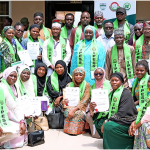



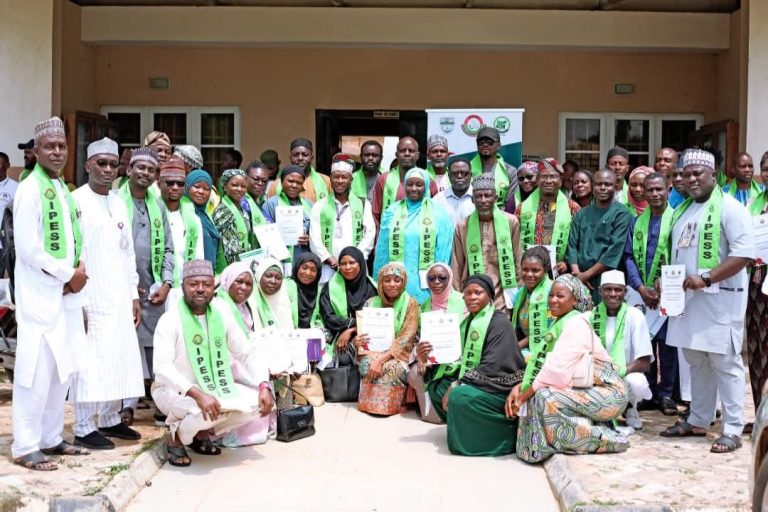

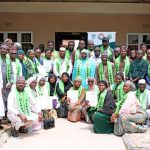
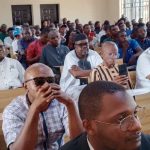
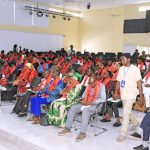

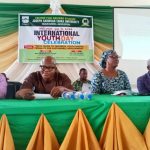
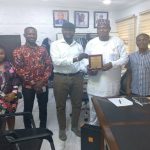
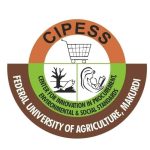
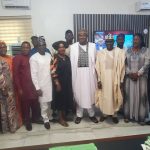
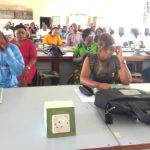

The Institute of Procurement, Environmental and Social Standards (IPESS) at Joseph Sarwuan Tarka University, Makurdi (JOSTUM), held valedictory sessions on Friday, simultaneously in Minna and Lokoja for 140 trainees in the Advanced Certificate Course Track B programme in Minna and Lokoja in Niger and Kogi States, respectively.
In a press release, Communication Officer IPESS JOSTUM, Aondohemba Michael Uche, disclosed that the Centre Leader and Director, Prof. Lami Nnamonu, commended the trainees for their commitment and patience, which resulted in the training programme’s success. Prof. Nnamonu was represented by IPESS Environmental and Social Safeguard Officer, Dr. Macsamuel Ugbaa.
She stressed that the Sustainable Procurement, Environmental and Social Standards Enhancement (SPESSE) Project was designed to build and strengthen human capacity in procurement, environmental, and social standards for better service delivery in the public and private sectors in Nigeria. She admonished the graduands to remain steadfast in their pursuit of professionalism to keep pace with the realities of the modern world, calling on them to put into practice the knowledge and skills acquired to bring about the desired positive change in their workplaces and society at large.
Delivering the keynote address with the theme “Drivers of Change,” the Standard Monitoring and Evaluation Officer of Environmental Standards, Dr. Gabriel Yager, enjoined the graduands to be good ambassadors of the Institute and apply the knowledge acquired. He said, “It takes only men and women of courage with a firm belief in human dignity and prosperity to actualize a positive change in an unfavourable environment. Sustain the already established relationship with the Institute by sharing your post-training success stories with the Institute.”
A graduating trainee, Dr. Deborah Bako, expressed satisfaction with the quality and delivery of the training, saying the knowledge and skills acquired would significantly impact their lives and professional journey. She stated, “We’ve had a wonderful experience during the training, from the rich lectures to the interactive sessions and even the industrial visits, which have broadened our understanding and equipped us with practical tools to tackle environmental challenges. We are confident that the skills acquired will enable us to make meaningful contributions to environmental sustainability.”
The Deputy State Training Coordinator, Niger State, Dr. U. Abdulkadir, in his vote of thanks, expressed profound gratitude to the Federal Government of Nigeria, the World Bank, and IPESS JOSTUM for initiating, sponsoring, and implementing the SPESSE project. He thanked the Vice-Chancellor and the Management team of the Federal University of Technology, Minna, for sustaining the partnership with IPESS JOSTUM, which led to the successful delivery of the Track B training programme in Minna. He encouraged the graduands to be the change they seek through the application of the takeaways from the three-week Advanced Certificate Course training.





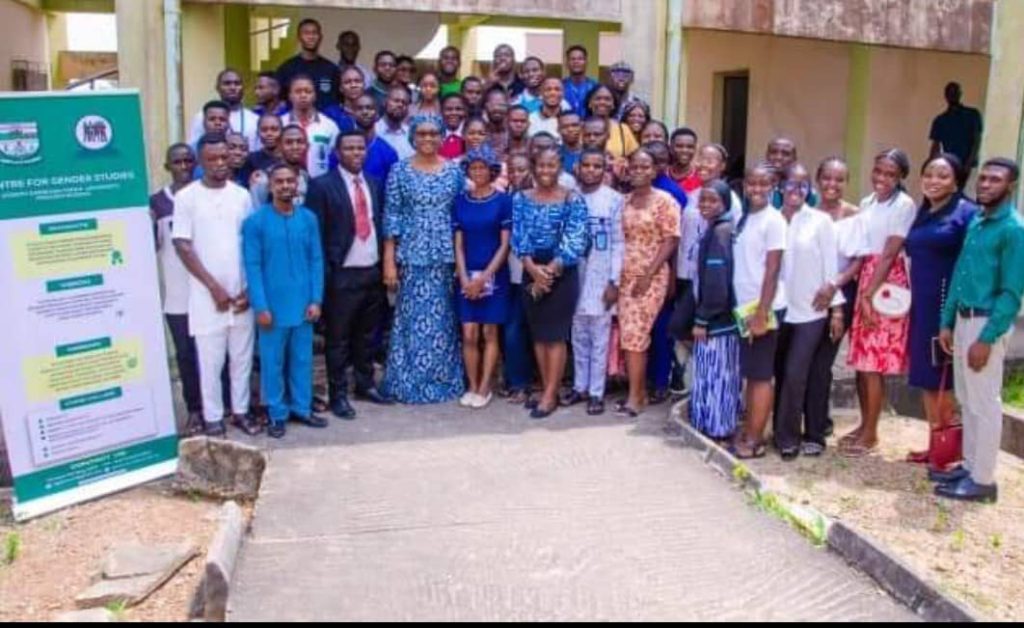
Commemorating the 2024 International Youth Day, the Center for Gender Studies, Joseph Sarwuan Tarka University, Makurdi organized a one-day symposium with the theme: “FROM CLICKS TO PROGRESS: YOUTH DIGITAL PATHWAYS FOR SUSTAINABLE DEVELOPMENT.”
The event was held on Monday, 12th August, 2024 at the College of Agricultural Economics and Extension Auditorium, North Core.
In his opening remarks, the Vice Chancellor, Engr. Prof. N.I Itodo represented by the Deputy Vice Chancellor Academic, Prof. Fidelis Ayatse charged the participants to make good use of the event as it x-rays the opportunities and challenges youths face in accessing digital technology. He urged them to utilize the knowledge to foster positive change.
In her welcome address, the Organizer and Director, Center for Gender Studies, Prof. Mrs. Orefi Abu said the International Youth Day is a day chosen by the United Nations celebrated globally every year to recognize young people’s vital contributions – and the need to release the potentials that they hold towards development and global economy. She added that the Day also recognizes their challenges and how to reduce them.
Prof. Abu noted that this year’s theme highlights the role of digital technology in achieving sustainable development goals – and draws attention to the important roles that youths play in these innovative processes.
She said that as young people, they have the ability to use their digital skills to promote sustainable development, and positive changes both within and outside our communities. She declared that the Center is ready to collaborate with the Student Union and other associations in the University to mark this day, going forward.
In the lead presentation titled “SIGNIFICANCE OF DIGITAL LITERACY FOR YOUTH EMPOWERMENT: CHALLENGES AND OPPORTUNITIES,” Dr. Chris Eche defined digital literacy as the ability to effectively and critically navigate, evaluate and create information using a range of digital technologies. He said there are two sets of people in the digital space; those who are able to critically navigate and those who are able to create information. He outlined the different levels of digital skills to include; Basic digital skills, Internet and communication skills, Information literacy, Literacy skill set, Content creation level, Cyber security and Problem solving.
Dr. Eche acknowledged that digital literacy is crucial for empowering the youth in various aspects of life from education and employment, to civic participation and personal development. He stated that while there are challenges to achieving digital literacy there are also significant opportunities to address these challenges through targeted policies, educational reforms, community initiatives, and innovative learning.
Presenting the second paper titled “YOUTH AND DIGITAL ADVOCACY: THE POWER OF SOCIAL MEDIA FOR SOCIAL CHANGE AND SUSTAINABLE DEVELOPMENT,” Dr. Mrs. Hephzibah O. Obekpa observed that in an increasingly advancing world, digital literacy has been identified as a powerful tool for driving social change. She said Social media platforms are not just for communication but powerful travel engines for organization and activism.
She pointed out that the power of the youth in digital advocacy can be explored through their unique perspectives and passion, creativity and innovation, energy and resilience, education and knowledge, social media movement, policy influence and intergenerational collaboration.
Furthermore, She explained that Social media for change and social development should be one that uses the resources responsibly with the next generation in mind – emphasizing that any change that has to be sustainable must look beyond the current generation.
Dr. Obekpa concluded that young people are not the leaders of tomorrow but change makers of today. She said digital liaising offers unprecedented opportunities for youths to amplify their voices, influence policies, and drive social change on a global scale; therefore, it is crucial that young advocates are equipped with skills, knowledge, and critical framework to navigate effectively and responsibly.
Speaking on the topic “YOUTH AND MENTAL HEALTH IN THE DIGITAL AGE” Dr. Nathaniel Iber said everybody loves good health whereas mental illness is an enemy of progress and it cuts across all ages. He noted that whenever a persons abnormal thoughts, feelings or sensory impressions cause him objective or security harm mental health is said to be present.
Dr. Iber explained that mental health could be caused by alcohol, excess stress and inability to organize time well. He opined that social media has become an integral part of youths’ lives, affecting their self esteem, body image, and overall mental well-being.
The Doctor said the impact of social media could result in anxiety and depression through cyber bullying, online harassment and digital addiction however it also provides platforms where one can seek help, like, seeking online therapy and also digital literacy and education.
In a closing remark Prof. Solomon Shola suggested that the University should enter into partnership with a Company to provide incoming students with tablets so as enhance easy access to information through their years of study.
He thanked the organizers of the event and hopes that the programme be sustained.
The event witnessed sessions of questions and answers, as well as drama presentation.
